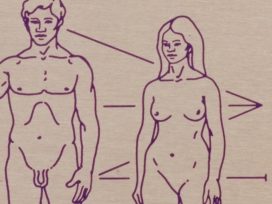In Dialogi 11-12/2009 , Mirjana Ule wrote on feminism that while neoliberal social models ensure gender equality in the private and public sphere, they nevertheless continue practicing forms of discrimination which young women often do not recognize and hence also do not resist in any organized way. In the same issue, and also later at a public presentation and debate on the occasion of its publication, we could witness what Slovenian feminism consists of today.
On the one hand, we have older feminists: social scientists who in the framework of the former Yugoslavia in the 1970s and 1980s had a direct impact on legislative and social changes for greater gender equality as a result of their research on the position of women. They seem to be the ones who see the current situation most clearly.
On the other hand, there exists a younger group of theoreticians who have given themselves over to post-structuralism and psychoanalysis, and publish articles in a language that is unintelligible to the majority of educated women. They theorize within their self-contained ivory tower and have no direct connection with the everyday life of most women.
In yet another group are splinters from the activist movement: today these are lesbians as a stigmatized, marginalized social group, and a group of trade union activists who fight for old rights. They fight, for example, for the preservation of special benefits for women in the new pension legislation, which at the same time also points to a de facto unequal position of women in society.
All of these are losing the battle with the right-wing antifeminist movement which has been gaining public momentum in Slovenia since independence. They are losing it among the population, in public opinion, the media, and in what could be called thinking or mentality. And they are losing it above all among members of their own gender.
All the public statements and interviews with Slovenian feminists on the occasion of this year’s International Women’s Day on 8 March addressed the issue of the ways in which women are still not equal to men, and how the new conservative ideology operates. Yet nowhere did I see an explicit reference by feminists to the conservatism and traditionalism within their own gender.
How, for example, do we come to terms with the fact that today the president of Slovenia’s most conservative party is a woman? And that this woman publicly objects to the right of same-sex couples to adopt a child, as proposed by the new family code, and that this denial of rights affects 98 per cent of lesbian couples? If there is a referendum on the issue and if (as my colleague Boris Vezjak says) the issue is settled by a majority opinion which is not necessarily committed to knowledge and truth, will the rights of the minority once again be outvoted? Or will some feminist ask how women voted?
Ten years ago, when the right of single women to artificial insemination was denied via a referendum, no one – as far as I am aware – analysed this result from the perspective of the female population. Yet a good half of Slovenian voters are women, and even if men voted against (and they didn’t) the solidarity of women voters could have voted in this right. But they didn’t, hence we cannot speak of women’s solidarity towards a minority within their own gender. Nor can we speak of women as a uniform population.
What did all those famous Slovenian women (as is typical, those selected were mainly singers, beauty contestants and actresses) think when at a round table discussion on TV during last year’s International Women’s Day they accepted the hosts’ concept of women’s issues as having to do with body and appearance. They answered silly questions such as “How do you take care of your looks, what does your body mean to you, would you have plastic surgery?” without protest. In all these cases we see an acceptance by women of some established mentality without bothering to reflect on or challenge it.
And yet the mentality has changed. In 1974, former Yugoslavia was the first country in the world to write into its constitution the right to freely decide on having children. A few years later, in 1977, the Republic of Slovenia wrote into its health legislation the termination of pregnancy as a medical procedure to be performed on demand by the pregnant woman, and this was also affirmed after Slovenia’s independence by Article 55 of Slovenia’s 1991 constitution. This article has been repeatedly attacked by the Slovenian political right, which has also tried to restrict abortion access by means of various proposed laws, but has failed each time. The public resisted and women simply refused to allow this right to be taken away from them.
Similarly, it is hard to imagine that the majority of Slovenian women would agree to return to the home and accept the role of housewife. Although regular employment was not fought for by feminist activists but was “given” to women by the socialist economy after the Second World War, women have learned in the last half century that financial independence also enables other forms of independence. Slovenian women have thus accepted numerous progressive laws governing work and family (which, it is important to note, Slovenia passed in the 1970s, at almost the same time as Sweden and well before Western Europe) as being both in their interests and self-evident. The mentality of the population has changed fundamentally as a result of these laws and their implementation in everyday life. But all these legislative changes even in the time of socialism were not made easily or without strong opposition.
If today’s Slovenian feminists had the courage to join theory with practice and shape a movement which would publicly oppose right-wing populism and systematically expose cases of hidden discrimination, perhaps in future many a prejudice would dissolve and many things that today are considered unusual would become generally accepted. Including among women themselves. But as demonstrated by the topic of feminism in the last issue of Dialogi, Slovenian feminists are not capable of forming such a movement at this time. This is clearly part of a wider phenomenon in our society in which right-wing populism is increasingly on the offensive, while that of the left is nonexistent, and the intelligentsia on the left is ever more disinclined to speak up publicly.






